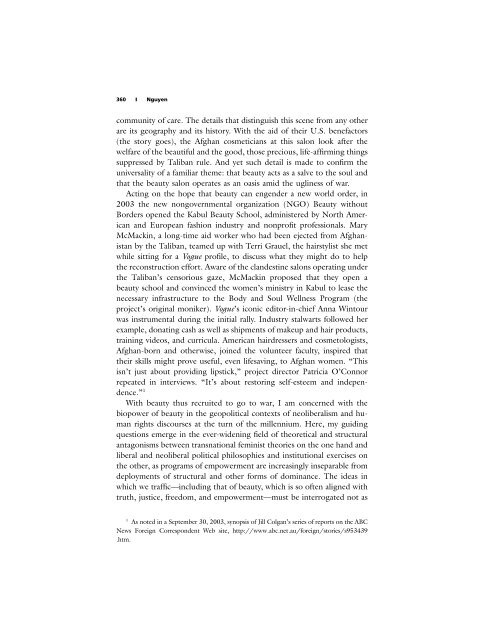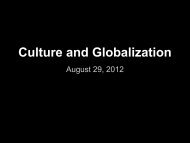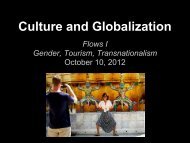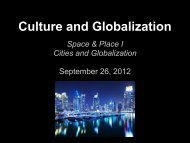Mimi Thi Nguyen, “The Biopower of Beauty: Humanitarian
Mimi Thi Nguyen, “The Biopower of Beauty: Humanitarian
Mimi Thi Nguyen, “The Biopower of Beauty: Humanitarian
Create successful ePaper yourself
Turn your PDF publications into a flip-book with our unique Google optimized e-Paper software.
360 ❙ <strong>Nguyen</strong><br />
community <strong>of</strong> care. The details that distinguish this scene from any other<br />
are its geography and its history. With the aid <strong>of</strong> their U.S. benefactors<br />
(the story goes), the Afghan cosmeticians at this salon look after the<br />
welfare <strong>of</strong> the beautiful and the good, those precious, life-affirming things<br />
suppressed by Taliban rule. And yet such detail is made to confirm the<br />
universality <strong>of</strong> a familiar theme: that beauty acts as a salve to the soul and<br />
that the beauty salon operates as an oasis amid the ugliness <strong>of</strong> war.<br />
Acting on the hope that beauty can engender a new world order, in<br />
2003 the new nongovernmental organization (NGO) <strong>Beauty</strong> without<br />
Borders opened the Kabul <strong>Beauty</strong> School, administered by North American<br />
and European fashion industry and nonpr<strong>of</strong>it pr<strong>of</strong>essionals. Mary<br />
McMackin, a long-time aid worker who had been ejected from Afghanistan<br />
by the Taliban, teamed up with Terri Grauel, the hairstylist she met<br />
while sitting for a Vogue pr<strong>of</strong>ile, to discuss what they might do to help<br />
the reconstruction effort. Aware <strong>of</strong> the clandestine salons operating under<br />
the Taliban’s censorious gaze, McMackin proposed that they open a<br />
beauty school and convinced the women’s ministry in Kabul to lease the<br />
necessary infrastructure to the Body and Soul Wellness Program (the<br />
project’s original moniker). Vogue’s iconic editor-in-chief Anna Wintour<br />
was instrumental during the initial rally. Industry stalwarts followed her<br />
example, donating cash as well as shipments <strong>of</strong> makeup and hair products,<br />
training videos, and curricula. American hairdressers and cosmetologists,<br />
Afghan-born and otherwise, joined the volunteer faculty, inspired that<br />
their skills might prove useful, even lifesaving, to Afghan women. “<strong>Thi</strong>s<br />
isn’t just about providing lipstick,” project director Patricia O’Connor<br />
repeated in interviews. “It’s about restoring self-esteem and independence.”<br />
1<br />
With beauty thus recruited to go to war, I am concerned with the<br />
biopower <strong>of</strong> beauty in the geopolitical contexts <strong>of</strong> neoliberalism and human<br />
rights discourses at the turn <strong>of</strong> the millennium. Here, my guiding<br />
questions emerge in the ever-widening field <strong>of</strong> theoretical and structural<br />
antagonisms between transnational feminist theories on the one hand and<br />
liberal and neoliberal political philosophies and institutional exercises on<br />
the other, as programs <strong>of</strong> empowerment are increasingly inseparable from<br />
deployments <strong>of</strong> structural and other forms <strong>of</strong> dominance. The ideas in<br />
which we traffic—including that <strong>of</strong> beauty, which is so <strong>of</strong>ten aligned with<br />
truth, justice, freedom, and empowerment—must be interrogated not as<br />
1 As noted in a September 30, 2003, synopsis <strong>of</strong> Jill Colgan’s series <strong>of</strong> reports on the ABC<br />
News Foreign Correspondent Web site, http://www.abc.net.au/foreign/stories/s953439<br />
.htm.





